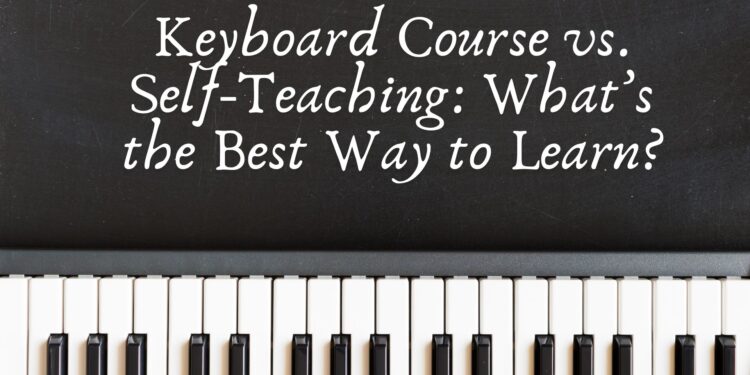Learning to play the keyboard is an exciting journey that can bring immense joy and personal satisfaction. However, aspiring musicians often find themselves at a crossroads: Should they enroll in a structured keyboard course or embark on a self-teaching path? Each approach has its own set of advantages and challenges, and the best choice depends on various factors, including learning style, goals, budget, and available time. This article explores both methods to help you determine the best way to learn the keyboard.
The Case for Keyboard Courses
Structured Learning Path
One of the biggest advantages of enrolling in a keyboard course is the structured curriculum. A well-designed course will guide learners from the basics to advanced techniques in a logical and progressive manner. This ensures that students develop a strong foundation, avoiding common mistakes that could become bad habits over time.
Guidance from Experienced Instructors
Learning under the supervision of an experienced instructor provides invaluable benefits. Teachers can correct posture, finger positioning, and playing techniques, reducing the risk of developing improper habits. They also offer personalized feedback, helping students overcome specific challenges and progress efficiently.
Motivation and Accountability
Courses, whether online or in-person, offer a sense of accountability. Scheduled classes and assignments encourage students to practice regularly, keeping them motivated and on track. This is especially beneficial for those who struggle with self-discipline.
Comprehensive Learning
Keyboard courses often include lessons on music theory, sight-reading, improvisation, and various playing styles. This well-rounded education can be essential for those who aspire to play professionally or compose their own music.
Networking and Performance Opportunities
In a formal learning environment, students can connect with peers who share similar interests. Group classes, recitals, and ensemble performances provide opportunities to collaborate, learn from others, and gain confidence in playing before an audience.
Potential Drawbacks of Keyboard Courses
Despite the advantages, keyboard courses may not be for everyone. The cost of lessons can be a significant barrier, and class schedules may not always align with a student’s availability. Additionally, some learners may find the structured nature of courses restrictive, preferring a more flexible approach.
The Case for Self-Teaching
Flexibility and Convenience
Self-teaching allows learners to set their own pace and schedule. This is ideal for individuals with busy lifestyles or those who prefer a less structured learning approach. With online tutorials, apps, and books, students can access lessons anytime, anywhere.
Cost-Effective Learning
Compared to formal courses, self-teaching is a more affordable option. Free or low-cost resources, such as YouTube videos, online articles, and mobile apps, make learning the keyboard accessible to virtually anyone with an internet connection.
Personalized Approach
Self-taught learners have the freedom to focus on the styles and techniques they enjoy most. Instead of following a fixed syllabus, they can explore jazz, classical, pop, or any genre they find appealing, making the learning process more enjoyable.
Developing Independence and Problem-Solving Skills
Teaching oneself to play the keyboard encourages critical thinking and problem-solving. Without a teacher to provide immediate guidance, learners must analyze their mistakes, research solutions, and experiment with different techniques, fostering a strong sense of musical independence.
Potential Drawbacks of Self-Teaching
While self-teaching offers flexibility and affordability, it also comes with challenges. Without proper guidance, beginners may develop poor techniques or misunderstand fundamental concepts. The lack of external motivation and accountability can also lead to inconsistent practice, slowing down progress. Additionally, self-taught learners may struggle with music theory, sight-reading, and other essential skills that structured courses emphasize.
Which Method is Right for You?
Consider Your Learning Style
If you thrive under guidance, benefit from structured lessons, and prefer external motivation, a keyboard course may be the best choice. Conversely, if you enjoy learning at your own pace, are self-disciplined, and have a strong sense of curiosity, self-teaching could be a great fit.
Define Your Goals
Your long-term goals should also influence your decision. If you aim to become a professional musician, a formal course may provide the comprehensive training needed. However, if you want to play for personal enjoyment, self-teaching might be sufficient.
Evaluate Your Budget and Time Commitment
Keyboard courses often require a financial investment and a commitment to regular lessons. If cost or time constraints are an issue, self-teaching offers a more flexible and budget-friendly alternative.
Hybrid Approach: The Best of Both Worlds
For many learners, a hybrid approach works best. Combining self-teaching with occasional lessons from a professional instructor allows for flexibility while ensuring proper technique and steady progress. Online courses, virtual mentorship, and self-paced learning tools can further enhance this blended approach.
Suggested Read: Bass Guitar Course
Conclusion
Ultimately, the best way to learn the keyboard depends on individual preferences, goals, and resources. A formal course provides structure, expert guidance, and a comprehensive education, while self-teaching offers flexibility, affordability, and personalized learning. By carefully considering your needs and possibly integrating elements of both approaches, you can embark on a fulfilling musical journey and achieve your keyboard-playing aspirations.

















